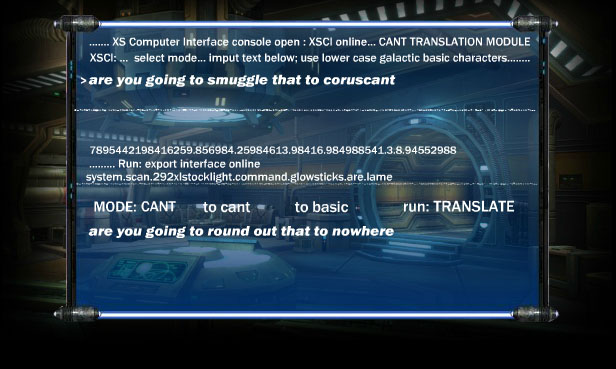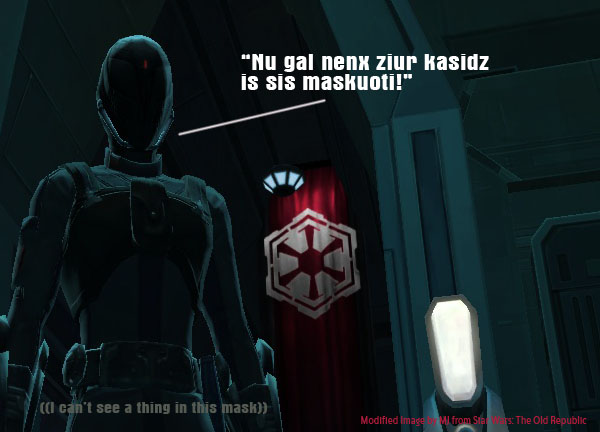Enhance Your RP with Authentic SW Languages
((The RP XP with MJ #45))
There really is no better way to show your seriousness about your characters, or the depths you’ll take to RP them, than to have them speak in their native tongue. Imagine your Pureblood Sith reciting the Sith Code in the ancient language of Korriban. Imagine your smuggler negotiating a deal using the Smuggler Cant in some shady corner, or your Mandalorian proclaiming the deeds of his clan in authentic Mando’a.
Fortunately, SWTOR exists in a time when you can find virtually any resource on authentic Star Wars languages on the Internet, and while “Trekkies” can enjoy their various super-in-depth Klingon or Romulan dictionaries, there exists a treasure trove of intensely detailed guides for Star Wars languages spanning everything from Ryl (Twi’lek) and Huttese to Jawa and Ewok. And, thanks to enterprising programmers who undoubtedly wear the Star Wars fan badge proudly, there are a number of “live” translators modeled on Google Translate that allow you to type your word or complete phrase and see it come back to you in your favorite Star Wars language.
I’ve used a few of these myself and thought it would be leah (Huttese for “nice”) to provide you with a guide of some of the best, as well as a few tips for using them effectively in RP.
WHEN TO DO IT
Before we get into the fun stuff, let’s start with the “when” and “how” to use authentic Star Wars languages in your RP. There are basically four instances when it would be appropriate to whip out your ch’ashe’an’ci tin’hi (Chiss for “silver tongue”).
The first rule is: DON’T OVER DO IT!
I can’t emphasize that enough. This is especially true if you’re not going to offer the courtesy of a live translation to your listeners. It slows down RP and can easily derail it if you’re not careful. Sure, it might be cool to throw out a string of Mando’a, but all anyone else is going to see is gibberish unless you take the time to translate for them. This doubles your amount of chat box input, and depending on your typing skills, can be a real drag.
So, keep it simple.
Use it “under your breath”:
For example, let’s say your Twi’lek character is standing at a bar when a burly individual saunters up to start talking smack about your favorite Huttball team. They notice your “Frog Dogs” practice jersey and decide to drop this on you:
[Degaron] says: “Heh. Nice jersey. The ‘dogs ain’t playin’ so hot this season.”
Quella looks up at the big guy in the armor. “What do you know about it?”
[Degaron] says: “I know their coaching staff outta be gutted.”
Quella mutters under her breath, “sahak tuev san.” ((Ryl for ‘don’t push me’))
A short phrase, a couple of words, even an authentic curse, will come off more authentically than if you decided to have your character speak “natively” the entire time you RP.
Use it during greetings or introductions:
For example, your Rattataki (who you play as raised in the swamps of Hutta) is introduced to a contact on the fleet.
Beznin bows to the Sith and introduces his Rattataki friend.
Ubadow runs a hand over her smooth pale scalp and smiles. “Achute, mah pateesa.”
Degaron [says]: “What is this gibberish, Beznin? What did you bring me?”
Beznin looks to Ubadow confused.
Ubadow [says]: “Forgive me, my lord. I was merely saying hello.”
You might want to clue in your RP friends that what your Rattataki said was, “Hello, my friend.” Give them the opportunity to respond in kind, because A) They don’t know you weren’t spitting insults at them, and B) It’s common courtesy to give them the opportunity to respond according to their character. Maybe a Sith Lord doesn’t like being called “my friend.”
Use it to emphasize titles or lore:
For example, your Pureblood Sith is teaching a new apprentice, also a Pureblood, the Sith Code in the ancient language.
Coohla kneels.
Naragath [says]: “Repeat after me, my apprentice, the words handed down since the time of Sorzus Syn.”
Coohla [says]: “Yes, master.”
Naragath raises his hands toward the rusty Korriban sky and speaks in a low drone, “Nwûl tash.”
Coohla [says]: “Nwûl tash.”
Naragath translates, “Peace is a lie.”
For simplicity sake, or perhaps to blend in amongst human Imperials when having to deal with them, your Sith will typically speak Basic. Show how pure your blood really is by reciting the Code in your given language. It also makes a simplistic and often-repeated master/apprentice lesson more “real.”
Use it in special ceremonies or events:
For example, your smuggler and her partner are meeting up with another smuggler on an orbital station. There are Republic soldiers on patrol here and you don’t want them to know what you’re talking about.
Blixx waves over Kendon
Kendon approaches, looking around cautiously. He nods to the two.
Blixx [says]: “This is Arnof. He’s ok. He’s with me.”
Kendon cuts to the chase, leaning close to whisper, “Are you gonna t-made the kesselsport these bothan goods to sister?”
Arnof looks to Blixx, confused.
[Group][Kendon]: ((It’s Smuggler’s Cant for – Are you going to transport these stolen goods to Corellia))
[Group][Blixx]: ((Thanks for the translate. I was looking that up : P ))
Blixx turns to Arnof. “I know what he said. Don’t worry about it.” She glances at the soldiers nearby. “We don’t want the keptiers on us.”
Arnof [says]: “You can clue me in later, boss. Let’s just get this done.”
Use of the “smuggler cant” can spice up (pun intended) any nefarious conversation, but be careful. Even though many of the words are Basic, the twisted way the Cant uses them can be confusing. Based on old English rhyming slang, it can be very hard to follow, and that’s on purpose because it’s used to hide your true intentions from people who may be listening in to your sneaky confabs. Like any authentic language, use it sparingly, or translate on the fly.
When not to use it:
Using authentic Star Wars language in your RP can be awesome. It can turn heads, spark up conversations, and it can show how seriously ensconced you are in your character. Don’t over do it, though. If you can just as easily say, “Naragath curses in the Sith language,” or “Blixx orders her drink in Huttese,” do it that way. Remember, RolePlay relies a lot on how something is delivered because the timing of how it’s delivered is subject to the typing speeds of those around you. Especially if you’re a slow typist, it’s best to keep language use to a minimum. A little will say a lot.
HOW TO DO IT
As I’ve mentioned, it’s best to keep your authentic language use to a minimum—unless you’re prepared to translate on the fly. Here are some simple rules to keep in mind:
ONE: Introduce your language…
Before actually “speaking” Huttese, offer some exposition to indicate that’s what your character is doing. This will give others the chance to let you know, “Hey, my guy speaks Huttese!” That may not mean he can write from a translator like you can, or that he—the player—actually knows the language. The bottom line here is that you’ll have to give this guy a translation as you go.
TWO: Translation…
Translation via ((OOC))
There are a few ways to provide a courteous translation to your language. The first, most simple, and connected way is to simply follow up your language phrase with a translation tucked inside OOC (Out-Of-Character brackets. “Nesooeefa! ((See you later)).” At least one of the multi-language translators I link to below actually gives you the option to have a bracketed translation included in your results.
Translation via /whisper or Group
This can be a lot of fun, especially if you’re in a closed RP between you and a friend. Passers by will be amazed by your wordplay and the fact you understand each other, until they peek behind the curtain and learn your whispered secret. Say your two Sith Lords are discussing the finer points of the Dark Side in the ancient Sith language. Follow up each string with a /whisper command to your friend to translate. Don’t be rude. If someone overhears you and their character makes a comment or asks a question, you might want to clue them in on what you’re doing OOC-ly before pulling them in ICly. If more than two of you are speaking outside of Basic, you can use a custom group channel (or simply Group) to translate.
Translation via substitution
It can become tiring, not to mention time-consuming and overly complex, to maintain a steady stream of Huttese, Ryl or Mando’a. Once you’ve established that your character is speaking in their given language, and you’ve shown some examples of what it “sounds like,” feel free to use an indicator to show they’re still speaking in their chosen tongue without you having to re-type everything they say.
For example, Khanda here is a Mandalorian speaking to fellow members of her clan. She just traded a few introductory phrases with them, they responded in kind, and now a full conversation begins in Mando’a (the Mandalorian language). Here are some examples to show she’s still speaking Mando’a though her player is typing in Basic:
Khanda [says]: [[M]] “Let’s go back to my ship and discuss this”
Khanda [says]: “~~Let’s go back to my ship and discuss this.~~”
Khanda [says]: “//Mando// Let’s go back to my ship and discuss this.”
Since (( )) is RP speak for OOC, avoid using parentheses to differentiate between your tongues. Other brackets, the tilde, or symbols can be effective cues. Be mindful of what other speakers use to show a continuation in the chat box. Avoid “~” if your RP partners uses it as a “to be continued” marker at the end of a line.
However you choose to notate your translation, make sure it’s understood by everyone listening, and if the conversation goes on for awhile, introduce newcomers with a refresher or reminder.
Khanda [says]: ((Khanda will be speaking Mando’a from now on. I’ll use “#” when she’s totally into Mando))
Khanda motions for her clan brothers to follow. “# Let’s go back to my ship and discuss this.#”
STAR WARS TRANSLATORS (LINKS!)
It’s time to have some fun! Here are my favorite links to some truly awesome Star Wars translators or language sites. Check them out, experiment, and explore. Jee ye wanya nudd bai bunno cay uba! ((“I look forward to chatting with you!” [Note: There is no Huttese word for “chatting” so I substituted “talking.” The meaning is the same. Keep word substitutions in mind as you use these translators.]))
Includes:
Cheunh (The Chiss Language)
Huttese (The language heard by aliens throughout SWTOR)
Minnisiat (The Trade Language used around the frontiers of the Chiss Ascendancy)
Old Corellian (The precursor to Galactic Basic)
Ortolan (The language of the little blue elephant-looking guys (eg. Max Rebo))
Ryl (aka. “Rylothian.” The Twi’lek language)
Through separate links, this site also includes:
Mando’a (The Mandalorian language, presented in an easy-to-follow phrase chart)
Sith (The ancient Sith language)
Smuggler’s Cant (The secret language of smugglers)
 (The Smuggler’s Cant interface is cool, but it requires Flash to run properly.)
(The Smuggler’s Cant interface is cool, but it requires Flash to run properly.)
This awesome site is an extremely functional multi-lingual translator based off the Google Translate engine. You simply choose the language you want to translate, type your phrase, hit return. Your translated string appears below the translate button, and you can easily copy/paste the line into the chat box. Words that can’t be translated appear in italics.
One of the features I like most about the site is the option to include your original string in angle quotes (<<like this>>). That makes for an easy cut/paste that includes the Basic translation from your chosen Star Wars language. For example: “atiay <<see you later>>”.
AMERICAN – BRITISH SPELLING LIST
I’ll bet you didn’t think the “Imperial Language” needed its own translator.
Since the first roundtable of jackbooted Imperials bandied about the Queen’s English in Episode IV we’ve been introduced to an Empire where the common “Imperial Accent” is really what the rest of the world knows as the British accent.
What many of you American-English language typists (like me) may not realize, however, is that there are distinct differences in the spelling of words between American and British vocabularies. The link above will introduce you to a comprehensive list of American and British spelling differences. Here’s a quick example:
American English: “Excuse me! What color is the flag flying above the armory?”
British English: “Excuse me! What colour is the flag flying above the armoury?”
If you want to take your Imperial Agent RP to the next level, throw in an extra “u” here and there. Some may think you’re prone to typos, but the truly knowledgeable will see what you’re up to. Seriously, though, I’ve used this technique and received /whispered accolades for my proper use of an “Imperial accent.”
This awesome dictionary-based Web site not only covers both canon and non-canon Huttese, it also offers links translations, or samples of translations, for everything from Bocce and Bothan to Neimoidian and Nikto with references to more than 50 Star Wars languages. Site creator Summer Wood has made a home for countless resources for Star Wars languages and has gone the extra mile in explaining the entomology of most of them, provided links to alphabets, and included some fun trivia as well.
Looking to translate some of those neon signs on Nar Shaddaa? Or maybe you want to spruce up that Guild Site with some authentic Aurebesh lettering. The link above will take you to the SWTOR TOOLS site Aurebesh text translator. Unlike a common alphabet chart, this awesome interface allows you to type in the English text and get back the Aurebesh below. Or, you can use the Aurebesh keyboard to reverse translate and finally find out what’s being advertised around the market bazaar.
Finally, a word about that most heinous of immersion-breaking language use: THE SWEAR WORD. Personally, I don’t mind colorful language (or colourful language as the Imps might say). I swear now and again myself. I even have characters who may swear from time to time. What they don’t do is drop the “F Bomb.” Canon-wise, Star Wars swears are pretty much relegated to ‘Hell’ and that’s about it. Extended Universe Canon, however, has a long list of Star Warsian words that would make a rancor blush, and they won’t get you reported to BioWare (remember, there are kids playing the game too).
The link above includes a list of terms, language, insults and derogatory slang (and their origins), a mopak load of Star Wars goodies. So, next time you want to drop the F Bomb, don’t be such a kriffing mudcrutch protie. Use this handy link and impress while you digress.
((The RP XP with MJ appears exclusively right here at swtor-life.com. Do you have an awesome Star Wars translator you’d like to share, or links to other RP resources? Contact MJ directly at swtorrp(at)gmail, or follow him on twitter @MJswtor))





